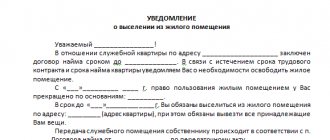Grounds for termination of housing relations
The basis for termination of housing relations is a legal fact. Termination of housing relations entails the termination of the rights and obligations of the parties - the landlord, the tenant, members of his family living together with the tenant (Part 2 of Article 453 of the Civil Code of the Russian Federation). In this case, the parties do not have the right to demand the return of what they performed under the obligation before the termination of the contract, unless otherwise established by law or by agreement of the parties (Part 4 of Article 453 of the Civil Code of the Russian Federation).
The grounds for termination of housing relations are the following legal facts.
1. Death of the tenant of the residential premises. The death (liquidation) of one of the parties to civil legal relations is an unconditional basis for the termination of these relations. In practice, the death of a tenant of residential premises located in the buildings of the state or municipal housing stock entails a change in the status of the tenant's family member who permanently lived with the deceased tenant to the status of a new tenant of the same residential premises. But if the deceased tenant was the only person living in the residential premises of the state or municipal housing stock, then this residential premises is considered vacant and can be provided in the manner prescribed by law to citizens in need of improved housing conditions. However, these rules apply only when the residential premises occupied by the tenant were not privatized at the time. Otherwise, the residential premises, which were privatized by the tenant, after his death are included in the estate and are inherited by law or by will.
2. Destruction of living quarters. In this case, the housing relationship is terminated due to the death of the subject of the legal relationship. The destruction of a residential premises is possible for various reasons, including as a result of demolition, destruction, damage due to military operations or natural and man-made emergencies.
3. Unsuitability of the residential premises for further living in it. In this case, unsuitability is understood as a condition of a residential premises that does not comply with sanitary, technical, urban planning standards and other requirements for residential premises. At the same time, residential premises cannot be considered unsuitable if living in them is impossible for a specific tenant suffering from any serious chronic diseases. The unsuitability of a residential premises is common to all persons living in a particular residential premises, regardless of their state of health.
4. Expiration of the lease (sublease) agreement for residential premises. This basis is typical for the termination of many civil legal relations, including public ones. The duration of the contract, stipulated among its terms, is the period of time during which the housing relationship exists. The expiration of the contract, on the contrary, entails the termination of these relations.
If housing relations arose as a result of the conclusion of a sublease agreement for residential premises in the houses of the state or municipal housing stock, upon the expiration of this agreement, the subtenant is obliged to vacate the residential premises.
5. Early termination (termination) of a rental (sublease) agreement for residential premises. Termination of any civil law agreement entails the termination of civil law relations that were based on this agreement. In accordance with Ch. 29 and art. 687 of the Civil Code of the Russian Federation, as well as Art. 79 and 83 of the Housing Code of the Russian Federation, a lease (sublease) agreement for residential premises can be terminated unilaterally or by mutual agreement of the parties to the housing relationship.
In accordance with Art. 450 of the Civil Code, at the request of one of the parties, a civil contract can be terminated only in court and only in cases provided for by law. The Civil Code formulates these cases only in general terms, giving the legislator the opportunity to specify them within the framework of specific housing legislation. So, according to Part 2 of Art. 450 of the Civil Code, a residential tenancy agreement can be terminated at the request of the tenant (subtenant) or the landlord only if any (several) of the above legal facts are present.
1. Unilateral refusal to fulfill the contract, when such refusal is provided for in the residential tenancy agreement itself, entails unilateral termination of the residential tenancy agreement.
According to Part 2 of Art. 83 of the Housing Code, the tenant of residential premises in houses of state and municipal housing funds has the right, with the consent of all adult members of his family permanently residing with him, to terminate the social tenancy agreement for residential premises at any time. Moreover, in the event of the departure of the tenant and his family members for permanent residence to another locality, country or to another residential premises, the social tenancy agreement is considered terminated from the date of actual departure.
In accordance with Part 4 of Art. 79 of the Housing Code of the Russian Federation, the tenant has the right to terminate the subtenant’s contract for the sublease of residential premises in social housing buildings. Moreover, if a residential sublease agreement was concluded with a subtenant without indicating a specific period of its validity, it is considered concluded for one year, and after this period the subtenant is obliged to vacate the residential premises occupied by him (Article 77 of the RF Housing Code).
According to Part 1 of Art. 687 of the Civil Code, the tenant of a residential premises under a commercial lease agreement has the right, with the consent of other members of his family permanently residing with him, to terminate the residential tenancy agreement at any time with a written warning to the landlord three months in advance.
As can be seen, in all of the above cases of rental of residential premises, the agreement (law) provides for the possibility of unilateral refusal to further fulfill the contract of rental (sublease) of residential premises.
2. In the event of a significant violation of the contract by one of the parties, at the request of the other party, the rental agreement for residential premises may be terminated in court (for example, the landlord has the right to demand the eviction of the tenant for systematic destruction and damage to residential premises, systematic use of residential premises for other purposes, etc. .). At the same time, such a violation of the terms of the contract by one of the parties is recognized as significant, which creates such damage to the other party that it is largely deprived of what it had the right to count on when concluding a rental agreement for residential premises (Clause 1, Part 2, Article 450 of the Civil Code of the Russian Federation ).
In accordance with Part 4 of Art. 83 of the Housing Code, a rental agreement for residential premises in houses of state and municipal housing funds can be terminated at the request of the landlord only on the grounds established by law, and only in court, with the exception of cases of eviction from houses threatening collapse. A residential sublease agreement can also be terminated unilaterally in case of violation of the terms of the sublease agreement (Parts 2 and 3 of Article 79 of the RF Housing Code).
According to Part 2 of Art. 687 of the Civil Code, a commercial rental agreement for residential premises may be terminated in court at the request of the lessor in the following cases:
- failure by the tenant to pay for the residential premises for six months, unless a longer period is established by the contract, and in case of short-term rental of residential premises, in case of failure to pay the payment more than twice after the expiration of the payment period established by the contract;
- destruction or damage to residential premises by the tenant or other citizens permanently residing with him in the residential premises, for whose actions the tenant himself is responsible.
By a court decision, the tenant may be given a period of no more than a year to eliminate the violations that served as the basis for termination of the residential lease agreement. If, within the period determined by the court, the tenant does not eliminate the violations or does not take all necessary measures to eliminate them, then the court, upon repeated application by the landlord, makes a decision to terminate the rental agreement. In this case, at the request of the employer, the court in the decision to terminate the contract may postpone the execution of the decision for a period of no more than one year.
According to Part 4 of Art. 687 of the Civil Code of the Russian Federation in the event that the tenant of a residential premises under a commercial lease agreement and other citizens for whose actions the tenant is responsible use the residential premises for other purposes (for example, when the residential premises are used for industrial purposes, as a warehouse, office premises) or systematically (twice or more) violate the rights and interests of neighbors, the landlord can warn the tenant about the need to eliminate the violations. In this case, it is important to pay attention to two points:
- apparently, citizens living on the same landing, in the same entrance, in the same house will be recognized as neighbors;
- the last (this may be considered the second) warning of the landlord about eliminating violations must be made in writing and contain an indication that another violation will lead to termination of the contract in court, and if the tenant and other citizens for whose actions he is responsible, after warnings continue to use the residential premises for other purposes or violate the rights and interests of neighbors, the landlord has the right to terminate the rental agreement in court.
If the basis for termination of the residential tenancy agreement was a significant violation of the contract by one of the parties, then the other party has the right to demand compensation for losses caused by the termination of the residential tenancy agreement.
3. A residential rental agreement may be terminated in court at the request of one of the parties due to a significant change in circumstances. At the same time, such a change in circumstances is recognized as significant when they have changed so much that if the parties could have assumed this in advance, then the rental agreement for residential premises would not have been concluded by them at all or would have been concluded on significantly different conditions (Part 1 of Article 451 of the Civil Code of the Russian Federation ).
In accordance with Part 3 of Art. 687 of the Civil Code of the Russian Federation, a commercial rental agreement for residential premises can be terminated in court at the request of any of the parties to the agreement:
- if the premises cease to be suitable for permanent (year-round) residence, as well as in the event of an emergency;
- in other cases provided for by housing legislation regarding eviction from residential premises in houses of state and municipal housing funds.
If the contract is terminated due to significantly changed circumstances, the court, at the request of either party, determines the consequences of termination of the contract based on the need for a fair distribution between the parties of the expenses incurred by them in connection with the execution of the residential rental agreement.
So, the lease (sublease) agreement for residential premises is terminated on the basis of an agreement between the parties on early termination of the contract or on the basis of a court decision made in the event of failure to reach an agreement. Moreover, if the parties have reached an agreement to terminate the residential tenancy agreement (bilateral termination procedure), the agreement must be concluded and executed in the same form in which the residential tenancy agreement was concluded and executed. In the event of termination of a residential rental agreement, the rights and obligations of the parties are considered terminated from the moment the agreement to terminate the agreement is concluded, and in the event of termination of a residential rental agreement in court - from the moment the court decision on termination of the agreement enters into legal force (Part 3 of Article 453 Civil Code of the Russian Federation).
Some scientists defend the point of view according to which the privatization of residential premises by the citizen living in it, or the privatization of the housing stock as a whole, or the privatization of state and municipal enterprises, organizations, institutions in charge of the housing stock, are also legal grounds for the termination of housing relations, since the legal regime of residential premises changes (it moves from state or municipal ownership to the ownership of citizens).
In a number of cases, the purchase of an apartment (residential premises) in the houses of housing construction and housing cooperatives through full payment of the share by a member of this cooperative may be recognized as grounds for termination of housing relations. However, this legal fact can also serve as a basis for changing housing relations, since after full payment of the share, the residential premises changes its legal regime (transfers from the ownership of the cooperative to the ownership of a citizen). In accordance with Part 1 of Art. 124 of the Housing Code of the Russian Federation, a person admitted as a member of a housing construction or housing cooperative, by decision of the general meeting of the cooperative, is provided with a separate apartment in accordance with the amount of his share contribution. A special basis for termination of housing relations is exclusion from a housing construction or housing cooperative. According to Part 3 of Art. 130 of the Housing Code of the Russian Federation, a member of a housing construction or housing cooperative may be expelled from the cooperative based on a decision of the general meeting of members of the cooperative in the event of a gross violation by this member without good reason of his duties established by the Housing Code or the charter of the housing cooperative.
The procedure for excluding a citizen from members of a cooperative is established by the charter of a housing construction or housing cooperative. The decision of the general meeting of the cooperative on exclusion may be appealed in court.
However, it is important to take into account that when a citizen is excluded from the membership of a housing construction cooperative and evicts him from the occupied residential premises, after the citizen has paid the share contribution in full, a forced seizure of the privately owned residential premises is actually carried out. Forced seizure of real estate in the housing sector without the consent of the owner is not allowed, unless otherwise provided by law or agreement of the parties. Forced seizure of real estate on the grounds provided for by law, in the absence of the owner’s consent, can only be carried out on the basis of a court decision.
As a rule, the result of termination of housing relations is eviction from the occupied residential premises. In accordance with Art. 84 of the Housing Code, eviction from residential premises in a state or public housing building occupied under a social tenancy agreement is allowed only in court according to three options:
- with the provision of other comfortable residential premises under a social tenancy agreement (Article 85 of the Housing Code of the Russian Federation);
- with the provision of other residential premises under a social tenancy agreement;
- without providing other living quarters.
According to Art. 688 of the Civil Code, in the event of termination of a residential tenancy agreement, the tenant and other citizens living in the residential premises at the time of termination of the contract are subject to eviction from the residential premises based on a court decision.
Deadlines for making a decision
The Civil Procedure Code of the Russian Federation does not indicate specific deadlines for making a court decision in cases of eviction of citizens from residential premises, however, it contains the rule that cases must be considered within a reasonable time. If the time for consideration of the case is delayed, the parties have the right to apply to the chairman of the court with an application to accelerate the time for consideration of the case. At the same time, replacing a judge when considering a case on the merits cannot be a basis for extending the trial period.
Important! The statement of claim is considered no later than 5 days from the date of receipt by the court. In his ruling, the judge indicates what actions must be taken to speed up legal proceedings.
Eviction with provision of another comfortable living space
Eviction with the provision of other comfortable residential premises in accordance with housing legislation is applied in the following cases.
1. The residential premises are recognized as unsuitable for permanent residence. In accordance with Art. 87 of the Housing Code of the Russian Federation, if the house in which the residential premises are located, occupied under a social tenancy agreement, is subject to transfer to non-residential premises or the residential premises are recognized as unsafe or unsuitable for permanent residence. Citizens evicted from it will be provided with other comfortable living quarters under a social tenancy agreement by the landlord.
2. If an eviction is carried out from a residential premises located in the house that is subject to demolition, and in accordance with Art. 86 of the Housing Code, such eviction is carried out in connection with the allocation of a land plot for state or municipal needs. Evicted citizens must be provided with other comfortable residential premises by the state authority or local government body that made the decision to demolish the residential building.
If a house containing apartments privatized by citizens is demolished, then the owners of the apartments, with their consent, are given equal ownership of residential premises or are paid compensation in cash. This responsibility is assigned to the body that made the decision to demolish the residential building.
In the event of the demolition of a house owned by a citizen on the basis of private property rights, in connection with the allocation of a land plot for state or municipal needs, the owner of the house and members of his family, as well as other citizens permanently residing in this residential building, are paid monetary compensation based on the average market the cost of residential space in a given locality, as well as all losses caused to the owner by the seizure of residential premises, including losses that he incurs in connection with a change in place of residence, temporary use of another residential premises before acquiring ownership of another residential premises, relocation, search for another residential premises premises for the acquisition of ownership rights to it, registration of ownership rights to another residential premises, early termination of one’s obligations to third parties, including lost profits (Part 7 of Article 32 of the Housing Code of the Russian Federation). In addition, the owner of the apartment (residential building) is given the opportunity to use, at his discretion, the materials remaining at the site of demolition of the house.
3. In case of eviction of family members of military personnel, officials of internal affairs bodies, state security bodies, customs authorities, those killed (deceased) or missing in action during the performance of military service or official duties, these citizens are provided with other residential premises, which must meet the established sanitary and technical rules and regulations to be located within the boundaries of a given locality.
4. If eviction is carried out in connection with major repairs when another residential premises are provided in exchange for the occupied one. This case of termination of housing legal relations is closer to a forced exchange than to eviction. This basis for termination of housing legal relations was discussed in more detail when considering the issue of relocation during major repairs.
When evicting on the grounds given above, citizens evicted from a previously occupied residential premises must be provided with another comfortable residential premises that meets the following requirements (Part 1 of Article 89 of the Housing Code of the Russian Federation):
- the residential premises must be well-equipped in relation to the conditions of a given locality, while the inadequacy of the previously occupied residential premises and the lack of communal amenities in it are not at all grounds for providing the tenant with ill-equipped residential premises;
- residential premises must meet sanitary and technical requirements;
- residential premises are provided to citizens equivalent in total area to the previously occupied residential premises; when evicting from a residential premises, the size of which is less than the provision norm in force in a given locality, the citizen is provided with another comfortable residential premises, taking into account this norm, and if the tenant previously occupied a separate apartment or at least two rooms, he should be provided accordingly a separate apartment or living space consisting of the same number of rooms in a communal apartment (Part 2 of Article 89 of the Housing Code of the Russian Federation);
- when providing residential premises, the occupancy of one room by minors of different sexes, with the exception of spouses, is not allowed, and the occupancy of one room by adults of different sexes, with the exception of spouses, is allowed only with their consent (Part 1 of Article 58 of the Housing Code of the Russian Federation);
- the residential premises must meet the health status of the tenant and his family members who permanently live in the same residential premises, i.e. it can be provided in excess of the norm for one person, but not more than twice, if such residential premises are one room or a one-room apartment or are intended for the occupancy of a citizen suffering from one of the severe forms of chronic diseases (Part 2 of Art. 58 Housing Code of the Russian Federation);
- comfortable residential premises provided to an evicted citizen in court must be indicated in the court decision on eviction (Part 3 of Article 89 of the Housing Code of the Russian Federation).
Judgment in eviction cases
As stated earlier, a court decision in eviction cases must be carefully reasoned and based solely on the evidence that was provided by the parties during the trial. The court decision must contain:
- introductory part - information about the parties to the court session is indicated;
- descriptive part – directly reveals the essence of the dispute;
- motivational part – contains the facts that the court was able to establish;
- operative part – indicates the court decision to evict citizens or to refuse to satisfy the plaintiff’s demands.
Eviction with provision of other living quarters
According to the housing legislation of the Russian Federation, eviction with the provision of other residential premises to the evicted citizen and his family members permanently residing with him is carried out in the following cases.
1. Eviction from official residential premises of citizens who are included in the list of persons entitled to the provision of other residential premises. So, in accordance with Art. 103 of the Housing Code of the Russian Federation, without the provision of other residential premises, after the expiration of the term of employment, service, tenure in an elected position, or early termination of these relations, tenants and members of their families included in the following list cannot be evicted:
- family members of military personnel, officials of internal affairs bodies, state security bodies, customs authorities, killed (deceased) or missing in action while performing military service or official duties;
- old age pensioners;
- family members of a deceased employee who was provided with official housing;
- disabled people of groups I and II, whose disability occurred as a result of a work injury due to the fault of the employer, disabled military personnel who became disabled of groups I and II due to injury, concussion or injury received during the performance of military service duties or as a result of a disease associated with being in military service .
2. Eviction from hostels of citizens falling under the list of persons given in Art. 103 Housing Code of the Russian Federation. Upon eviction, these citizens are provided with another residential premises.
3. Eviction of citizens due to failure to pay for housing and (or) utilities. In accordance with Part 2 of Art. 687 of the Civil Code of the Russian Federation, a commercial rental agreement for residential premises can be terminated in court at the request of the lessor if the tenant fails to pay for the residential premises for six months, unless the contract specifies a longer period, and in case of short-term rental - in case of failure to pay payment more than twice in a row upon expiration of the payment period established by the contract. In accordance with Art. 15 of the Law of the Russian Federation “On the Fundamentals of Federal Housing Policy”, in the event that payment for housing and utilities under a social tenancy agreement is not made within six months, citizens are subject to eviction in court with the provision of residential premises that meet sanitary and technical requirements , according to hostel standards. Taking into account special circumstances, this period may be changed at the level of legislation of the constituent entities of the Russian Federation.
4. Eviction of the owner of the mortgaged residential building (apartment) and his family members in the event of foreclosure on the mortgaged residential building (apartment). The owner of a residential building (apartment) who has lost residential premises as a result of foreclosure on this premises, acquired through a loan from a bank or other credit organization or funds from a targeted loan provided by a legal entity for the purchase of a residential building or apartment, and pledged to ensure repayment of the loan or targeted loan loan, if at the time of foreclosure such housing was the only one for them, has the right to be provided with residential premises in houses of a flexible housing stock.
Other residential premises provided to citizens in connection with eviction must meet sanitary and hygienic requirements and be located within the boundaries of the given locality. The living area of another residential premises must be no less than the size established in a given locality for registering citizens in need of improved housing conditions (not lower than the registration norm). In this case, other residential premises provided to the tenant and members of his family must be precisely indicated in the court decision to evict the tenant.
Statement of claim to court
A statement of claim for eviction, a sample of which you can find on our website, is filed in accordance with Articles 131 and 132 of the Code of Civil Procedure of the Russian Federation. The claim must contain information about the parties to the proceeding, the substance of the dispute and the requirements of the parties. The document can indicate specific witnesses who will need to be questioned during the trial. The court must make a decision to accept the statement of claim for proceedings within 5 days from the date the document is received by the office. All documents held by the parties must be attached to the statement of claim; their list includes:
- certificate of ownership and other title documents;
- application to law enforcement agencies and housing inspection;
- receipt for payment of state duty.
In addition, the parties have the right to submit written evidence when considering the case on the merits and to file motions to obtain evidence through the court.
Legislative regulation
Legal regulation of the eviction of social rent tenants occurs in accordance with Articles 83-85, 90-92 of the Housing Code and Article 293 of the Civil Code of Russia.
Article 92 of the Housing Code of the Russian Federation defines a service apartment, which is allocated for temporary use.
Accommodation in this apartment is possible after the signing of a social rent agreement by representatives of the municipality and potential tenants.
According to the law, a citizen can be evicted from an apartment only upon expiration of the contract, which terminates when the person quits his job. Other reasons for eviction are specified in Articles 83, 85, 95 of the RF Housing Code.






